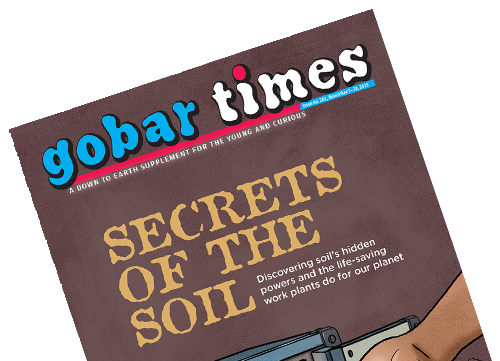
Do we ever stop to think where all the trash that we produce goes? Most of it heads to a dumpsite – yes, those mountains of waste that you might have seen on one of your trips around the city. Let's dig into this subject a bit, shall we? ********************************** A huge dark mountain is looming up amidst houses and buildings, with a flock of crows and eagles circling over it. As one goes closer, you can see people on it...

A snippet of the vibrant activities conducted from the kindergarten tiny-tots to the high-school teenagers under the Green Schools Programme ************************************************************************************** Online education became the talk-of-the-town in 2020 when the entire globe succumbed to an unknown lockdown for more than 300 days. Students became weary and so the entire education community sprung up to the challenge. Country-wide they took to their screens like wildfire, proving their resilience in a jiffy. At the Pawar Public School, Chandivali, we went a step beyond with the Green Schools …

India has more than 1.5 million schools and 260 million students. Think about a regular day in these schools before the pandemic. Imagine the amount of waste— food waste, plastic, paper, stationery—produced in these schools in a day. Now, add COVID-19 waste to it as schools across the country are reopening. Imagine all of this waste going to landfills. Alarming, isn’t it?

A group of college students from South Delhi's Aryabhatta college has started a unique initiative. They call it Project Palaash. Project Palaash aims to salvage floral waste and create organic dyes that are purely non-synthetic in nature. These organic dyes are then used on fabrics. These fabrics are dyed by the socially and economically underprivileged, thereby creating employment opportunities for destitute community members.

Learn how to create a mini aquarium model and watch the vibrant colours of the sea enhance the look of your house

Mahatma Gandhi was no stranger to the problems of waste and he dedicated his entire life urging individuals to shun wasteful consumption. Here are a few schools that are living the Gandhian values of mindful consumption and efficient resource use. India is drowning in waste. Every year we generate 62 million tonnes (MT) of waste and half of it ends up in landfills. Of the total waste collected, only 19 per cent undergoes treatment. This is the dismal state of waste management in our country today. Mahatma Gandhi was no stranger to the problems of waste and he dedicated his entire life urging individuals to shun wasteful …

The little things in life are easy to misplace. What's even easier is to lose them. Here's a way to find all your little belongings at one place and make sure that you don't lose them. Step 1: Take a rectangular cardboard box with a lid. You can use a discarded shoebox from the house. Step 2: Open the lid of the shoebox and measure its height with the help of a scale. Note the reading. Step 3: Take the leftover cylindrical cardboard from a finished roll/sheet of aluminum foil and cut it into smaller parts... Read more here.

We all know pistachios to be tasty little green nuts but how many can say they have known them to be a fun craft?

